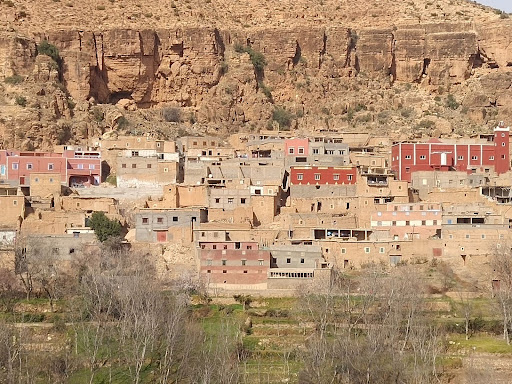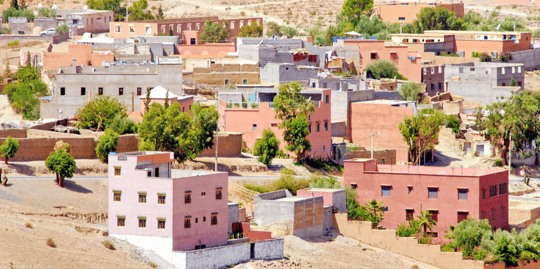By Ikbale Bouziane,
Cultural Field Coordinator, Dakira Program

Anougal is a douar (village) located in a remote plateau in the heart of the High Atlas Mountains (precisely 16.3 kilometers from the center of Amizmiz) with 750 families whose income relies mainly on olive, walnut, cherry, almond, and apple trees. During a recent field visit, HAF-Dakira team members held a focus group discussion with local elders regarding a water conflict with Amizmiz, identified as their main problem that has persisted since 2005.
The population relies heavily on the main river that crosses the plateau (as opposed to the local streamflow source) because of its proximity to parcels of land. The unpredictability of rainfall that aliments the river has forced Anougal and the villages located downhill, Amizmiz and Mtaa, to alternate use of the source for agricultural needs.
Anougal participants also expressed several other concerns: worry over the potential of migration brought about by drought; an inability to dig wells; wild boars that roam the plateau and ruin the vegetation (but which removing or injuring would bring a jail sentence); and the women’s need for marketing strategies to sell a rug inventory taking up space in their homes.
Through the USAID Dakira Program, implemented by the High Atlas Foundation (HAF), the communities can engage in an activity to help them find solutions to their problems. HAF has suggested creating dialogue between Anougal and Amizmiz community members to raise awareness of social solidarity as a factor of sustainability, to learn of historical approaches to resource use, and to develop their capacities on sustainable water management. Together, the communities and HAF can raise awareness about climate change issues for local youth by creating two school clubs as well as valorizing ancestral crafts by engaging and empowering women through capacity-building training delivered by HAF.
The participants expressed their willingness to reconcile with their neighboring community members and to share with the younger generation their history as well as teach them to celebrate and value the cultural and natural riches of Anougal.
This article was completed with the support of the United States Agency for International Development (USAID) Dakira Program, and the High Atlas Foundation is solely responsible for its content, which does not necessarily reflect the views of the USAID or the Government of the United States.
